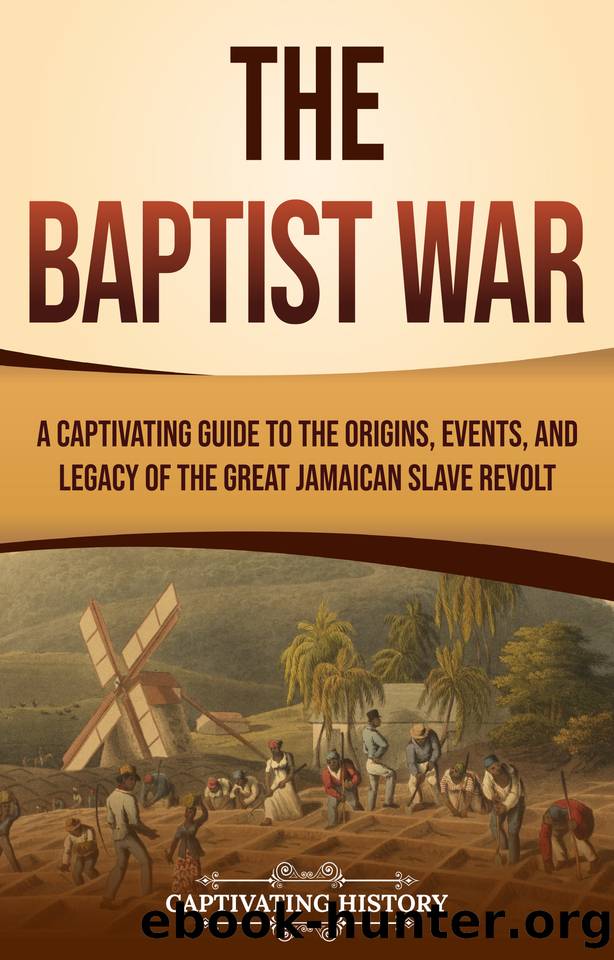The Baptist War: A Captivating Guide to the Origins, Events, and Legacy of the Great Jamaican Slave Revolt (History of Slavery) by History Captivating

Author:History, Captivating
Language: eng
Format: epub
Published: 2024-08-05T00:00:00+00:00
Chapter 6 â The Making of Samuel Sharpeâs Conspiracy
The most important figure in the Baptist War was Samuel Sharpe. Not a great deal is known about the man. He was born about 1801, and his parents were imported from Africa, probably from the Gold Coast, sometime between 1787 and 1801.
As we mentioned earlier, Sharpe worked in some capacity as a house slave at Cooperâs Hill, not far from Montego Bay, and seems to have been a companion to his ownerâs children. At the end of his life, Sharpe said that he had never been beaten or flogged and had been very well treated (Zoellner 2020, âIsland,â 26).
While we know Sharpe was literate, how he learned to read and write is not known. He was later married, and his wife lived on a different plantation, which was a common situation. They had one child, a daughter (Encyclopedia.com, âSharpeâ n.d.).
Confusingly, Samuel Sharpeâs owner was Samuel Sharpe, Jr., owner of Cooperâs Hill and a lawyer. A document from 1817 shows he then owned twelve slaves, including a 12-year-old boy called âArcher.â Another document from 1832 indicates he owned thirty-two slaves, which shows that the lawyer was achieving considerable success in Jamaican terms. The 1832 document lists Archer, alias Samuel Sharpe. The boy Archer at some point began using the name Samuel Sharpe. Perhaps the slave admired the master? (Zoellner 2020, âIsland,â 26).
Sharpe was sold or rented to a Miss Williams who ran a boarding house in the town of Montego Bay. He was sent back to the plantation because he had destroyed a musical instrument in a fit of religious piety (Zoellner 2020, âIslandâ 26). This example of piety may be a clue to Sharpeâs religious views. Some of the nonconformist sects took a dim view of music or dancing as frivolous and immoral. This probably means he also frowned on rum and other alcoholic drinks. It is unknown whether this apparent puritanical streak was lifelong.
Sharpe was sold to the Croydon plantation. Counting the boarding house experience, he was rented or sold at least twice, which was not an uncommon experience for slaves. Why he was sold is not known. His owner might have needed cash, wanted to remove him from the plantation, or even desired to give Sharpe a better situation. These transitions did not isolate him because he maintained friendships with men named Dove and Gardiner at Cooperâs Hill, who became important leaders in the war (Scott 2022).
The Baptist Church was what gave Sharpe his beliefs. He became a deacon, a respected position with a good deal of responsibility. His personal theology seems to have been a combination of what the missionaries preached and what he read in his Bible. Sharpe also seems to have been an earnest participant in discussions of religious matters.
In 1807, a heavily censored version of the Bible was published for the use of slaves, titled Select Parts of the Holy Bible for the Use of Negro Slaves in the British Caribbean Islands. Among the parts left out was the story of the Israelitesâ flight from slavery in Egypt.
Download
This site does not store any files on its server. We only index and link to content provided by other sites. Please contact the content providers to delete copyright contents if any and email us, we'll remove relevant links or contents immediately.
| Antigua | Bahamas |
| Barbados | Cuba |
| Dominica | Dominican Republic |
| Grenada | Haiti |
| Jamaica | Saint Kitts |
| Saint Lucia | Saint Vincent |
| Trinidad and Tobago |
Cat's cradle by Kurt Vonnegut(15324)
Pimp by Iceberg Slim(14476)
4 3 2 1: A Novel by Paul Auster(12363)
Underground: A Human History of the Worlds Beneath Our Feet by Will Hunt(12080)
The Radium Girls by Kate Moore(12012)
Wiseguy by Nicholas Pileggi(5763)
The Fire Next Time by James Baldwin(5422)
Perfect Rhythm by Jae(5392)
American History Stories, Volume III (Yesterday's Classics) by Pratt Mara L(5293)
Paper Towns by Green John(5174)
Pale Blue Dot by Carl Sagan(4993)
A Higher Loyalty: Truth, Lies, and Leadership by James Comey(4946)
The Mayflower and the Pilgrims' New World by Nathaniel Philbrick(4484)
The Doomsday Machine by Daniel Ellsberg(4480)
Killers of the Flower Moon: The Osage Murders and the Birth of the FBI by David Grann(4433)
The Sympathizer by Viet Thanh Nguyen(4382)
Too Much and Not the Mood by Durga Chew-Bose(4333)
The Borden Murders by Sarah Miller(4302)
Sticky Fingers by Joe Hagan(4184)
